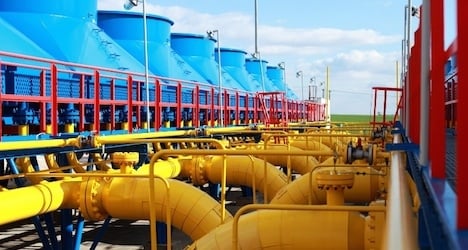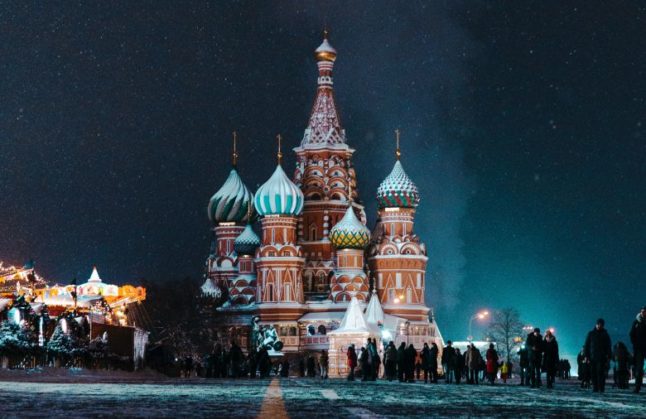According to the energy regulator E-Control, Gazprom supplied Austria 15 percent less gas than had been previously agreed.
Similar issues have hit Poland, which has seen their supplies cut by 45 percent, and Slovakia, which has ten percent less gas than expected for the period.
Bernhard Painz, head of E-Control's gas division suggested that "One explanation is that storage in Russia is being filled, and there is therefore less gas available for transit, meaning less for import to Europe."
Robert Lechner, a spokesman for Austrian energy supplier ÖMV told the Austrian National Broadcaster ORF on Thursday that "The information we got is that deliveries are still a little bit under the originally agreed level, which means this is a range of fluctuation of between 10 to 15 percent, which is normal for the season."
"Nobody needs to be worried their gas hob will not work," said Lechner, adding that the company's gas storage reserves were more than 90 percent full.

Photo: APA (Jäger)
Gazprom has denied that it is supplying less gas. Industry observers believe that it is too early to say whether the issue is a supply bottleneck or a result of the tense political environment.
Austria's chancellor has discussed the Ukraine conflict in terms of its effects on energy, slamming Russian president Vladimir Putin for his aggression, "deception and salami tactics."
Poland's Accusation
Poland on Thursday accused Russia's Gazprom of slashing gas deliveries by half, which analysts said was likely aimed at sending a message to the EU amid tensions over the Ukraine conflict.
Separately, Slovakia reported a 10 percent drop in supplies, while Austria reported a 15 percent fall off.
Analysts also saw the cuts to Poland as the Kremlin's way of upping the pressure ahead of key talks on resuming Russian deliveries to war-torn former Soviet Ukraine.
But the Russian energy giant denied cutting supplies by 45 percent as Warsaw claimed, insisting daily deliveries remained stable at 23 billion cubic metres.
The supposed cut appears to result from Gazprom's failure to supply Poland with additional orders, over and above the daily volumes it has received up to now.
Poland's allegations came as tensions run high between the two countries over Ukraine, where Warsaw has supported Kiev in its battle against pro-Russian separatists in the east.
Warsaw has repeatedly called for tougher sanctions against Moscow over its role in the crisis.
Poland is also highly dependent on Russian gas. Of the 16 billion cubic metres it consumes annually, over 60 percent is imported, mainly from Russia.
Poland's PGNiG gas utility, which observed a first cut in deliveries on Monday, said on Thursday it would plug the gap in supplies with deliveries transiting through the Czech Republic and Germany.
"There's no risk to Polish clients," PGNiG spokeswoman Dorota Gajewska said, but added that it was forced to suspend its so-called "reverse flow" transfers to Ukraine.
Economy Minister Janusz Piechocinski later said Gazprom had vowed its Friday deliveries would be in line with the volumes ordered by Warsaw.
Ukraine's main gas utility Ukrtransgaz claimed Wednesday the cut to Poland was designed to squeeze its energy supplies by "cutting the reverse flow we are receiving" from European Union states.
Poland is among several Gazprom clients in the EU, including Slovakia and Germany's RWE, which have pumped gas to Ukraine after Moscow cut supplies in June over unsettled debt.
The "reverse flow" transfers have angered the Kremlin.
'Warning shot'
Further turning up the heat on Moscow, the European Union was due to level fresh sanctions against Russia on Friday.
They will notably target Gazprom and others in its energy sector, a European source told AFP on condition of anonymity.
The move caused the Russian ruble to plunge to another record low against the dollar on Thursday.
The European Commission has also invited the Russian and Ukrainian energy ministers for fresh talks on September 20 in Berlin that are aimed at resuming Russian gas deliveries to Ukraine. Moscow has not yet agreed to participate.
Analysts said the supply shortfall to Poland, and to a lesser extent in Slovakia, could be an attempt by Moscow to up pressure on the EU at a key juncture in the Ukraine crisis.
"We believe that in this way Gazprom is trying to strengthen its bargaining power ahead of upcoming negotiations with Ukraine and the EU," Bank of America Merrill Lynch analysts told AFP on Thursday.
Meanwhile PriceWaterhouseCoopers Polska chief economist Witold Orlowski said the gas cut could be seen as Moscow targeting those EU members who were once under its thumb.
"It seems to be a kind of a warning shot directed at the Central and Eastern European members of the EU to keep them aware of the fact that Russia can do a lot of harm to their economies," Orlowski told AFP.
"It also can be seen as a kind of response to EU sanctions, targeting the smaller EU members in Moscow's former sphere of influence, not its larger Western partner."
"But it's a risky policy, as it further undermines Moscow's credibility in Western Europe. It's not the best idea: either you're a reliable supplier of gas or you're not," he said.
In Austria, energy official Bernhard Painz, from the regulatory authority E-Control, said Gazprom may have been filling Russian reserves, leaving less for export.
But Warsaw-based political analyst Krzysztof Bobinski said Moscow was using the cuts to send "a shudder down the European Union's spine before the winter".
"Basically they're saying: 'It's still warm, the winter isn't upon us yet but remember, we have this weapon'," he told AFP.
Austrian Federal Minister of Economy Reinhold Mitterlehner also downplayed concerns over gas supply during an interview with the Ö1 Mittagsjournal radio programme later on Friday.
He said that while seasonal fluctuations were a possible reason for the reduced supply, in light of the current circumstances he also did not believe it was a coincidence.
Portions of this story were contributed by AFP.



 Please whitelist us to continue reading.
Please whitelist us to continue reading.
Member comments